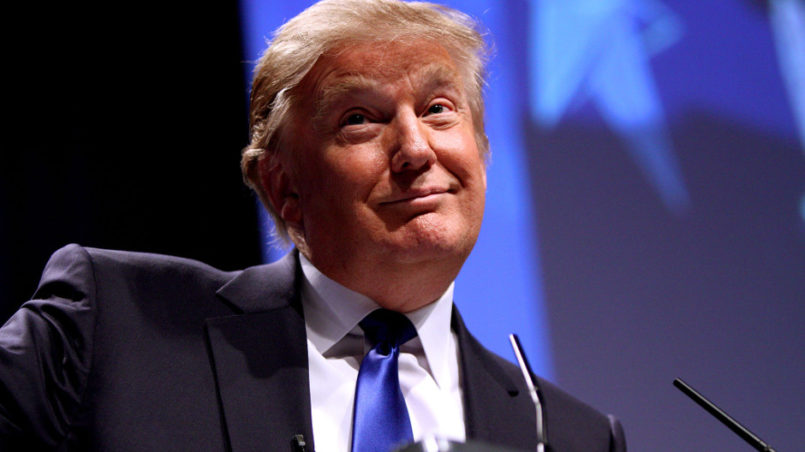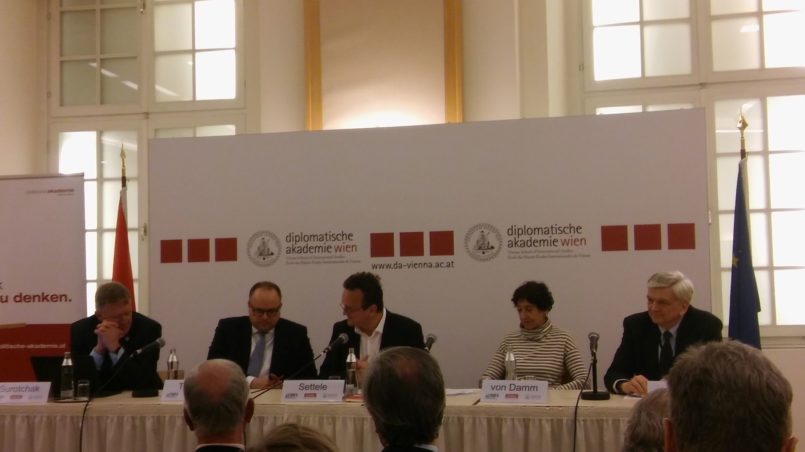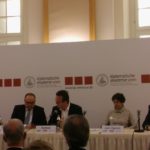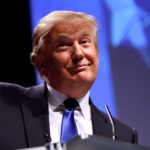Future US Foreign Policy under Donald Trump

On this evening the Diplomatic Academy offered the possibility to discover more about a highly current topic in their hallowed halls: What can be expected from the new US President, Donald Trump, and his foreign policy? What traditions will he continue? Where will new approaches be taken? Will he be as chaotic as some of his words would lead us to expect?
In his key note talk, Jan Techau from the Carnegie Institute, introduced the American Academy. It was founded 20 years ago by Richard Holbrooke in Berlin and serves the cultural and scientific exchange between Germany and the USA. It offers American authors and researchers the possibility to spend a semester in Europe.
The Person Trump
According to Techau, domestic policy will be the focus of the new President. This is why he was elected. Many Americans value his business experience. As regards foreign policy, Trump can be formed as can be seen in the diverse changes of opinion (recently as regards Israel’s settlement policy).
The hearing of the long-standing Exxon CEO and designated Foreign Minister, Rex Tillerson, did not run very encouragingly. The new secret services head, Dan Coats, is, on the other hand, known to be quiet and conservative.
It is obvious that Trump is no fan of diplomacy. He prefers to work with Twitter and in this way addresses his fans directly.
Trump’s idea of policy-making comes from the business deal, which concerns business and reciprocity. Its basic principle is the conclusion of bilateral constructions. Multilateral agreements, such as TTIP, TPP or the climate agreement are too complex for him. The advantage of this is that, in almost all negotiations, the USA is automatically the stronger partner.
China is the greatest enemy of the American worker (“death by China”). Trump sees the rivalry with China in purely economic terms, not in a geo-political sense. However, his analysis falls too short – the greatest danger is automation and not the cheap Chinese labour.
With its huge purchase of American government bonds, China can be seen rather as a stabiliser. Because a change in leadership is happening in the middle of 2017, and due to the fact that the country is somewhat weak in economic growth, Peking is reacting extremely nervously to the statements from Washington.
Trump may not have any direct business interests in Russia but not only family ties connect him to the largest country in the world. The USA could, according to Techau, cooperate with Russia against the interests of Europe – Putin would in any case be a suitable partner in the rising conflict with China.
TPP has already been suspended – a fact which the Chinese are rejoicing about. The North American trade agreement, NAFTA should also be re-negotiated. The Iran nuclear deal should also be dissolved since, in the eyes of the new administration, it would be bad for the USA and Israel.
Trump wants to stimulate the economy via an investment programme and reduce debts with the added revenue from taxation. Should this programme be successful, the dollar will rise, whereby exports will become more expensive. Techau doubts that this is the correct path to take in order to create workplaces in the USA: the planned tax cuts for wealthy Americans are also regarded critically:
Significance for Europe
As a result of the USA being the dominant power in western Europe since World War II, all intra-European conflicts have been put on hold since then. With the beginning of the withdrawal of American soldiers after the end of the Cold War, the USA, long before Trump, counted on the fact that Europe had overcome its conflicts. The crisis in 2008 and the resulting nationalisation tendencies in many countries, however, raise doubts as to this.
Because Article 5 can no longer be guaranteed unconditionally, Europe should open up in a geo-political sense and strive for a new order from within or, as the former German Foreign Minister said: Europe has to grow up as regards power politics. China and Russia are naturally extremely interested in an opening up – China is already heavily involved in eastern Europe. The increasing dependence of the eastern Europeans on Chinese money will lead to a further restriction of the negotiating ability of the European Union in the future.
The lesson for Europe, according to the former ambassador to the US, Lanz, has to be more European integration which does not correspond with the current trend. The majority principle has to be finally introduced in the European Council. On an international level, small countries are dependent on multilateralism – their individual votes do not carry enough weight. Even Great Britain and Germany have no influence over the White House; change will only be effected through unity.
If commitment is shown in resolving global or national conflicts, Washington is prepared to talk. If one flees from responsibility, like Austria on the Golan Heights, the doors shut. The question has to be posed of how valuable such commitment is to us.

The Pacific instead of Europe
Multilateral diplomacy is not for those with weak nerves, according to Hans Peter Manz. Trump is a unilateralist and not particularly able to reach a consensus. In relation to NATO, there are top militarists in Trump’s team who will not readily allow changes to be made within the organisation.
The main interest of the USA in terms of security and the economy, according to Manz, has moved towards the Pacific where the markets and the challenges of the future can be found. In Europe, most problems have already been solved: the Soviet Union has been defeated economically, many eastern European states have joined the EU. The inner-European problem, which led to two world wars, has also been solved in the opinion of the USA.
Clinton and Obama were already of the opinion that money should be received from the Europeans for their protection, e.g. in 2012 at the Chicago summit.
Manz sees the long term goals of US foreign policy as unchanged: free trade as well as the objective of spreading democracy in the world are still on the long-term agenda.
Jan Surotchak describes the milestones of the last 20 years which have brought America to where it is today: Francis Fukuyama’s proclamation that the end of the story would be reached with the fall of the Soviet Union and the dominance of the USA as the only remaining super power did not come true. The Americans were not prepared for this outcome.
Red lines were also defined which were subsequently not complied with (e.g. the use of chemical weapons in Syria). Because of this, foreign policy is defined as unimportant in the minds of many Americans or there is a desire for at least a change in the strategy. Incidentally, domestic policy has also been at the centre of every American election campaign.
Nobody really knows what Trump intends to do. Which of the long-term trends of American foreign policy, which are named after former presidents, will he turn to? According to Surotchak, that of Jackson: the military has to be strong enough to defeat America’s opponents or at least to extensively intimidate them. One will look in vain for the Hamilton (free trade) or the Wilson (the establishment of peace in the world by an expansion of democracy) approaches from him.
According to Surotchak, the Tweet on Taiwan was definitely planned: regarding the approaching confrontation with China, the working class in the USA are on Trump’s side. The domestic audience (in this case the working class) is not discerptible from the foreign one. Taiwan’s hopes for a close and clear connection to the USA will, with a high probability, not be fullfilled.
It remains to be seen how the relationship to Russia will develop. Techau assumes that Putin will execute some form of test (escalation in the Ukraine or similar) in order to test the boundaries of the negotiating possibilities. Putin will in no way rely on blackmail – if such material even exists – for this he thinks too strategically.
A final question concerned Melania Trump: Jan Surotchak still has no opinion about her. Until now, however, no First Lady was ready for her role. He recommends that more attention be paid to Trump’s daughter, Ivanka, and her husband. Here he sees great potential.
In summary, nothing much more than speculation can be said about the future direction of American foreign policy. Certainty about the programme will only be gained when the, at times highly divergent, words are transformed into deeds.
Credits
| Image | Title | Author | License |
|---|---|---|---|
 |
Panel | Christian Janisch | CC BY-SA 4.0 |
 |
Donald Trump | Gage Skidmore/Wikipedia | CC BY-SA 3.0 |
